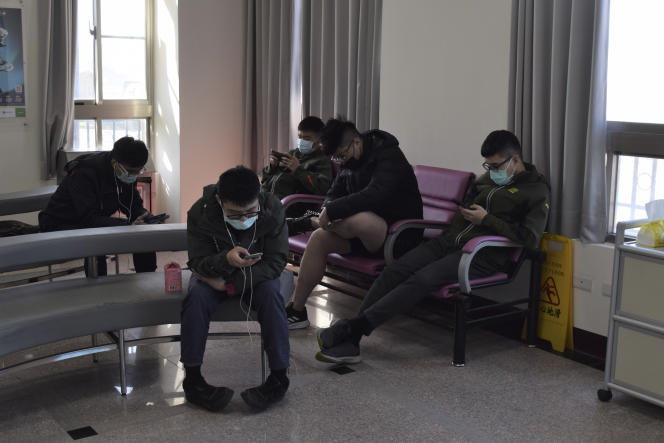Impossible to spot the slightest sign of worry or anxiety in the busy streets of Taipei, the capital of Taiwan, on a Saturday in late May. An air of carelessness and lightness floats on the esplanade lined with small restaurants and tea bars, in the Shilin district, known for its night market. The five schoolgirls wandering around have their eyes glued to their phones. Some are on the TikTok application, others on Xiaohongshu, “little red book” in Mandarin (in reference to the collection of quotes from Mao Zedong). Exclusively available in China and Taiwan, Xiaohongshu is primarily a forum for Gen Z consumers who like to discuss fashion, looks and makeup. But we also see cooking videos, dance lessons, reading and travel suggestions.
The schoolgirls show each other their screen while chatting. When asked what they think of China and the risk of a war launched by Beijing to take control of the island, they hesitate… “We are not the same country, but we belong to the same culture”, launches the boldest. Before concluding : “War, no, I don’t believe in it. » Who would they vote for if they were of the required age (20) in the January 2024 presidential election? They are unanimous : “Ke-P”, nickname of Ko Wen-je, the populist candidate of the small Taiwan People’s Party (TPP).
They would therefore vote neither for the Democratic Progressive Party (DPP) nor for the Kuomintang (KMT), the two heavyweights of the Taiwanese political landscape. The DPP advocates an affirmation of Taiwanese identity (as opposed to mainland Chinese identity). In power from 2000 to 2008 and again since 2016, he is suffering the effect of wear and tear. As for the KMT, the former Chinese nationalist party, it is openly in favor of a rapprochement with China. These teenagers have no idea of the political or economic program of their favorite candidate; it’s just “for his way of speaking” And “because it is on the networks” that they would vote for him.
Depoliticized youth, an ideal target
“In Taiwan, of course, there are pro-KMTs and pro-DPPs, but also a lot of people who don’t really have a preference. These are the people China is targeting. Because if you control that group, you control the election results. », analyzes Puma Shen. The young professor of criminology, a specialist in the mechanisms of Chinese influence in Taiwan, founded a research center on the subject, Doublethink Lab, and a training center for civil defense, the Kuma Academy, named after the black bear from Taiwan. The depoliticized youth, in his eyes, constitute an ideal target for Beijing.
You have 72.9% of this article left to read. The following is for subscribers only.
